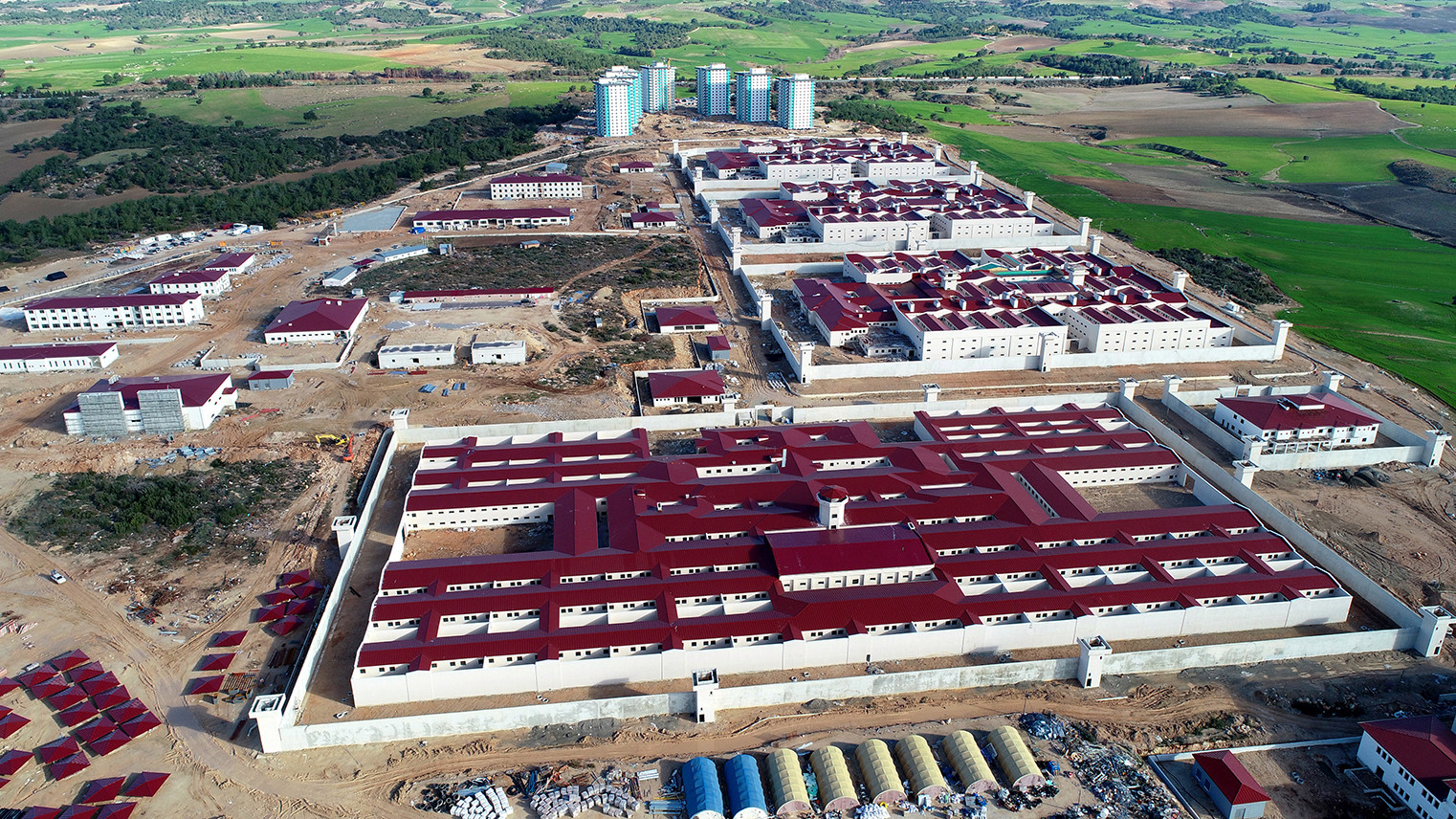For years, he has been one of Turkey’s most outspoken human rights advocates, taking to the floor of parliament and social media with tales of abuse, torture, and midnight arrests at the hands of the government of President Recep Tayyip Erdogan.
But just after midnight on April 2, Omer Faruk Gergerlioglu, a member of parliament for the opposition Peoples’ Democratic Party (HDP), found that it was his turn. The police were waiting at his door, arrest warrant in hand.
“It started politely, but soon we found ourselves screaming as the police dragged our father away,” Faruk’s son, Salih Gergerlioglu, told me in April. “Suddenly he was gone, and we realized they hadn’t even let him put on his shoes.” Stripped of his parliamentary immunity in March, the 55-year-old lawmaker had been charged with “spreading terrorist propaganda” over a series of tweets from 2016 that criticized the government’s abandonment of peace talks with Kurdish insurgents.
“His real crime was broadcasting reports of rights abuses in parliament,” his son said. “He was one of the last who dared share the stories of victims of abuse in prisons, in police custody, and anywhere else.”
Omer Faruk Gergerlioglu, a Turkish member of parliament for the left-wing Peoples’ Democratic Party, is surrounded by MPs applauding and brandishing placards after he was dismissed following a vote at the Turkish parliament in Ankara on March 17. ADEM ALTAN/AFP VIA GETTY IMAGES
When he was taken in, Gergerlioglu joined a population of political prisoners in Turkey that has ballooned since the fateful night of July 15, 2016, when a failed military uprising against Erdogan killed hundreds, deeply traumatized Turkish society, and triggered a crackdown on opposition voices that continues at warp speed a half-decade later.
A massive expansion of the country’s prison network is abetting that crackdown and its accompanying human rights abuses.
Satellite imagery reveals construction on 131 prisons beginning between July 2016 and March 2021, with Turkish Ministry of Justice documents and press reports indicating nearly 100 additional facilities under consideration by Erdogan’s government.
The current rate of construction is more than double that in the four years before the failed coup—a time when mass arrests and political imprisonment in Turkey were already generating international alarm. Over that period, 64 prisons were observed under construction via satellite imagery.
Prisons have grown in size as well as number. The floorspace of prisons built after 2016 increased by an average of 50 percent when compared to the previous period, with photos published by the government and local media showing three-story prison blocks replacing two-story designs popular before the coup, and a measurement of new and old facilities via satellite imagery showing prison layouts also sprawling over larger areas of land.
Turkey’s government has made no secret of its prison-building spree. Yet a closer look reveals the unprecedented scale of its efforts, which include sprawling facilities rising in remote corners of the country, a plan to build one of the largest prison complexes in the world, and a massive overall increase in the government’s capacity to punish dissent.
New prisons would allow Turkey’s government to further increase an inmate population that surged to nearly 300,000 in 2019 from 180,000 after the failed putsch. For the first time last year, Turkey’s incarceration rate ranked highest among all 47 member states of the Council of Europe.
A representative from Turkey’s justice ministry did not reply to multiple interview requests for this article. But Justice Minister Abdulhamit Gul has publicly described Turkey’s new prisons as urgently needed to solve the problem of chronic overcrowding and help close scores of out-of-date facilities.
“Yet the mentality of this government is to immediately fill whatever prison it builds,” Gergerlioglu said in an interview before his own imprisonment. “And new prisons will do nothing to stop human right abuses occurring in jails while the justice ministry willingly turns a blind eye to them.”
In the aftermath of the 2016 coup attempt, Turkey announced a state of emergency, granting Erdogan sweeping powers to dismiss hundreds of thousands of public servants, ban public assemblies, and arrest opponents.
Less visibly, the emergency law helped demolish budgetary and zoning restrictions for prison construction, allowing Ankara to rapidly issue prison contracts to firms close to the government, as the veteran Turkish investigative journalist Cigdem Toker reported in a series of articles in 2017.
“The government says older prisons are simply being replaced. But tiny, antiquated facilities are being traded for mass prison complexes,” Toker said. “It comes across like a plan to imprison more people than ever previously considered.”
Featuring towering concrete walls, guard towers, and rows of narrow courtyards running along their interior, 75 of the post-coup facilities viewed by Foreign Policy were built as maximum-security facilities. The remaining 56 were built as minimum-security prisons.
The Sincan prison megacomplex, located outside the Turkish capital of Ankara, is where Gergerlioglu was imprisoned in April. Since 2016, the facility has surged in size. Its official capacity grew by roughly 60 percent, from 6,500 to around 10,900 inmates. The addition of four large, high-security compounds to the site puts Sincan’s overall size at 420 acres, half the area of New York’s Central Park.
Across Turkey’s rural interior, new complexes have risen up like small, self-contained cities, located far outside the nearest towns. On the outskirts of the central Anatolian city of Aksaray, population 423,000, a colossal, 519 million lira prison (equivalent to $145 million in 2017 terms, when the contract was issued ) with space for 6,000 inmates will soon replace a city jail of crumbling limestone walls. The new complex is “the largest single investment in the history of Aksaray,” a local official stated in 2017.
The Scale of One Prison in Aksaray
A colossal prison on the outskirts of Aksaray cost $145 million and will house 6,000 inmates.
GOOGLE SATELLITE IMAGES
More prisons are on the way. Officials are planning a 15,000-inmate facility in the northwestern province of Bursa. The complex would be among the largest in the world, equal in capacity to Rikers Island, the largest contiguous prison complex in the United States, and outsized only by the biggest of internment complexes built for Muslim minorities in the Chinese province of Xinjiang.
So far, the post-coup building spree is set to increase the total capacity of Turkey’s prisons by more than 70 percent, to at least 320,000 from around 180,000 in 2016.
Construction has marked a huge outlay for a struggling economy and cash-strapped government.
Government sources place the cost at between 11.2 billion and 13 billion Turkish lira ($1.3 billion to $1.5 billion).
Erdogan himself, normally keen to champion controversial government megaprojects as key to Turkey’s development, has refrained from speaking directly about new prisons.This July, he pledged to convert a prison in Diyarbakir, the country’s largest Kurdish-majority city, into a cultural center, acknowledging the 10-acre facility’s long history of “oppression, torture, and inhuman treatment” amid the Turkish state’s 37-year war with Kurdish insurgents. He did not mention the colossal, 230-acre replacement complex his government has built on the city’s outskirts over the last decade, a prison with far improved facilities but with its own growing list of abuse allegations.
The bad optics may be clear to a man who was himself jailed for reading an Islamist poem in public in 1997 and who, despite his vast powers, still often casts himself as an outsider and victim of injustice.
Erdogan and Gergerlioglu once walked the same path. They came from pious, working-class families and grew up disillusioned with the country’s secularist order.
Gergerlioglu became a doctor, but by the early 1990s he found himself preoccupied with activism against Turkey’s ban on headscarves in state institutions. He gained a national reputation for pious human rights work and backed Erdogan’s ruling Justice and Development Party (AKP) during its first hopeful decade in power.
Yet the AKP’s authoritarian turn made Gergerlioglu an unsparing critic. In 2018, he became a deputy for the Kurdish-rights-focused HDP, even as Erdogan jailed its leaders. Gergerlioglu’s stubborn commitment to human rights has made him a last hope for people like Zuleyha Koc, a middle-aged mother of two, who recently watched on her cellphone as the lawmaker spoke out against her husband’s own two-year imprisonment.
“Some days, it feels like we fell off the face of the Earth,” said Koc, who watched Gergerlioglu’s speech via an opposition-run YouTube channel. “This makes me feel like maybe we haven’t.” Her husband, Lutfi Koc, formerly worked as a dorm supervisor at a private school in a city on the Aegean coast. In 2019, the 46-year-old was sentenced to more than eight years in prison on charges of membership in a terrorist organization.
A confidential witness accused him of delivering lectures to students on behalf of Fethullah Gulen, a self-exiled preacher whose elusive faith network stands accused by Turkey’s government of masterminding the coup attempt.
The Gulen movement had once paved Erdogan’s road to power, leveraging a network of followers in the judiciary and police to dismantle the old secularist order, jail journalists, and intimidate critics. But a power struggle erupted between Erdogan and Gulen in 2013. Erdogan prevailed, and since 2016, the wrath of the state has fallen on hundreds of thousands of suspected members of what his government now brands a terrorist organization, known by the acronym FETO.
Leaving little room for ambiguity, state-controlled media widely refer to the prisons rising across Turkey as “FETO prisons,” while the acronym has become an indiscriminate moniker for any critic of Erdogan. Indeed, the term defines the lives of countless people like Lutfi Koc, who are either low-level Gulenists or ordinary citizens ensnared by a vengeful justice system.
“The last time I spoke to Lutfi, he said he had been beaten by guards during his transfer from one prison to the next,” Zuleyha Koc said. “He said a doctor was called when his eye started bleeding. But once the bleeding stopped, he says they started beating him again.”
International and local rights groups have catalogued tales of torture and abuse in prisons with skyrocketing frequency since the failed coup. They describe beatings by guards, violent threats, sexual assault, rape, and humiliating and repeated strip searches of female inmates.
“In 2019 we received quite a few reports of torture and abuse,” Berivan Korkut of the Civil Society in the Penal System Association, a Turkish prison reform group, told me in May. “And in 2020 that number increased even further.”
Korkut listed a range of chronic abuses, including overcrowding, the withholding of medical treatment, and severe restrictions on inmates’ communications with lawyers and family members.
She added that new facilities may ease overcrowding but aren’t likely to impact other abusive practices. In fact, in at least three cases reported since 2017, the opening of new prisons has almost immediately been accompanied by outcries of torture among inmate’s families.
Turkey’s justice ministry has declared investigations into those incidents. But that does not satisfy Gergerlioglu, who said that the hundreds of reports of abuses he has forwarded to the parliament’s human rights commission overwhelmingly go unanswered.
He chronicles a growing list of tragedies that define Turkey’s prison system: a schoolteacher who died in prison after she lost access to medications needed to treat a chronic illness, a lawyer for political prisoners who died on hunger strike while protesting her own imprisonment, the more than 800 children younger than age 6 who live in prison with their mothers—a number that has grown sharply since the failed coup.
For Lutfi Koc, the biggest challenge of imprisonment has been a lack of access to medical care. In 2019, doctors found two cysts in his brain. It took more than a year for Koc to access the care he needed to confirm the cysts were not cancer.
“They abandoned my husband to his death,” his wife said. She added that he remains in ill health, losing weight and experiencing occasional hallucinations that have prompted him to request additional hospital visits.
Medical care—and nearly every aspect of prison life—has been immensely complicated by COVID-19. Turkey’s government says that 50 inmates have died in its prisons since the onset of the virus, and it maintains that it is taking strict precautions against the virus in these facilities.
Zuleyha Koc disputes that claim and says her husband fell ill from COVID-19 in late 2020. In her telling, he endured chronically overcrowded prison cells with other clearly sick inmates, an experience punctuated only by long periods of solitary confinement.
The crisis in Turkey’s prison system is no less alarming when told through official statistics. These numbers suggest a system near breakdown and severely unprepared to manage the excesses of its own government.
To accommodate the incredible surge in new prisoners since the coup attempt, Turkey’s Justice Ministry has released around 190,000 nonpolitical prisoners—a number greater than the entire pre-coup prison population—in two separate amnesties since 2016. Yet the prison population still surged to stratospheric highs. The prison population hit nearly 300,000 in the first half of 2020, outstripping a national prison capacity of only 233,000, despite a first amnesty. Today, the official number sits at nearly 288,000 despite a second amnesty meant to reduce prison overcrowding amid the COVID-19 pandemic. And though an unknown number of those inmates have been granted temporary house arrest as part of the amnesty, the measure expires in November, while the overall inmate population far exceeds Turkey’s current prison capacity of around 250,000.
Prisoners of conscience have been barred from release even under the COVID-19 amnesty, with pro-democracy philanthropist Osman Kavala and HDP co-leader Selahattin Demirtas remaining imprisoned despite international outcry. Violent offenders, meanwhile, have been let go, with opposition media chronicling a rash of femicides and domestic violence by inmates released in 2020.
Also freed in 2020 was far-right mafia leader Alaattin Cakici, known for organizing the assassinations of dozens of leftists in the 1970s, contracting the murder of his ex-wife at a ski resort, and issuing open death threats to opposition journalists from his prison cell in 2018.
Zuleyha Koc, meanwhile, cannot secure house arrest for her husband, despite his health and the special needs of their severely disabled 6-year-old son. “It takes all my strength not to break down in front of my children,” she said. “Every minister and official remains silent, every court denies my appeals.”
Many in Turkey would have little sympathy for so-called enemies of the state like Lutfi Koc. But they should, argues Korkut, the prison reform advocate. “The government has sharply increased incarceration rates for nonpolitical crimes as well as political ones,” she said. “Mass incarceration has become the norm in Turkey over the last 15 years, with almost zero public debate.”
After being released from the Sincan prison, Gergerlioglu hugs a relative in Ankara on July 6. ADEM ALTAN/AFP VIA GETTY IMAGES
On July 1, Turkey’s Constitutional Court unexpectedly ruled that Gergerlioglu be freed and his prison sentence annulled.
But few could place their trust in Turkey’s highest judicial authority, given that Erdogan’s government has brushed aside its release rulings in the past—as well as those from the European Court of Human Rights.
Opposition parties scrambled to launch a joint campaign for Gergerlioglu’s freedom when he remained in prison days after the decision, while Gergerlioglu’s son was violently detained by police during a protest at the gates of Sincan prison.
Amid the growing outcry, Gergerlioglu was finally released late on the night of July 6. “Justice has not returned to Turkey,” he told me. “But my freedom shows that even now, activism can occasionally make a difference, even in the highly controlled justice system.”
Still, around 4,000 of Gergerlioglu’s fellow HDP members remain behind bars, including nine members of parliament.
And though Erdogan promised judicial reforms and improved prison conditions earlier this year, rights groups say recent measures only increase the potential for retribution against inmates who report abuse.
Meanwhile, the prisons keep coming. In the first three months of 2021, Turkey’s justice ministry finalized contracts for six new facilities. That news unnerves Toker, the investigative journalist. “This construction is simply inseparable from the claims of torture and inhumane conditions that grow by the day,” she said.
Gergerlioglu told me he was not subject to abuse in prison but said he was repeatedly struck by police officers during his transfer to Sincan prison in April. His status as a lawmaker was restored by parliament on July 16.
But it’s hard to be optimistic about the future.
A motion filed in March to permanently close the HDP—Turkey’s second-largest opposition party—is underway, and it would ban over 450 of the party’s members from politics. A mass trial of over 100 of the HDP’s leaders began in April. Its former co-chairman, Demirtas, remains imprisoned despite calls for his release from Turkey’s Constitutional Court and the European Court of Human Rights in 2020.
The facility where he is held has doubled in size around him since he was first confined there in 2016.
“We have not seen the end of political jailings,” Gergerlioglu said. “But we have no choice but to continue the struggle for justice.”
Noah Blaser is an independent journalist who is based in Washington, D.C. He worked as a journalist in Turkey between 2011 and 2017.
By: Noah Blaser
Source: FP






